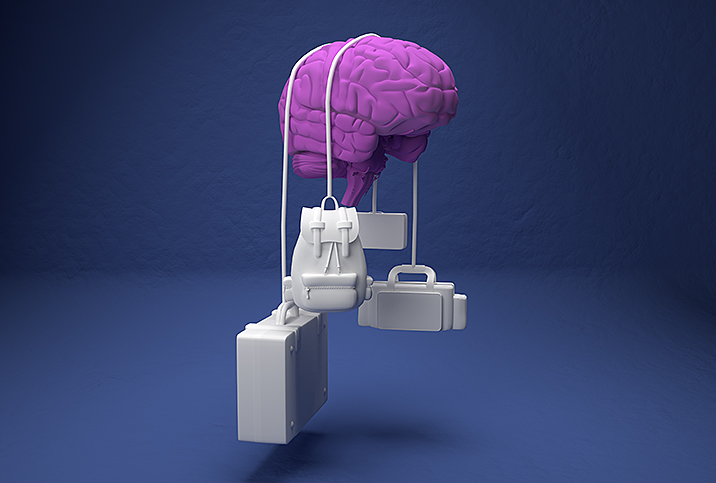Hey, You! Are You an Emotional Dumper?

Most everyone vents their feelings. It's part of being human. We verbalize emotions so we can better process them.
At least, that's what we tell ourselves.
There's a line, however, between letting off steam and callously dumping raw emotions on your loved ones. Unfortunately, the line is not always recognizable.
The impact of emotional dumping is draining, particularly if left unchecked.
If there was a golden rule for venting, it would be that you stick to only one topic and respect the other person's feelings, time and space. However, "emotional dumpers" overwhelm people by continuously dropping emotional baggage on the heads of everyone around them—turning them into emotional dumpsters—without regard for their well-being.
While identifying and reacting to emotional dumpers in life is hard, admitting we do this is even more of a challenge.
What is an emotional dumper?
"An emotional [dumper] is someone who regularly 'dumps' their emotional baggage onto people," said Pippa Murphy, a London-based sex and relationship expert for Condoms.UK. "They use their friends, family members or even strangers as a sounding board for their problem, without offering support or solutions in return."
The behavior manifests in a multitude of ways, such as constantly venting about personal issues without regard for other people's needs, seeking validation for their feelings without reciprocation, constantly complaining, or refusing to acknowledge offered advice, even when requested.
Without any available statistics on this particular social phenomenon, the commonality of emotional dumpers is impossible to quantify. However, it's probably fair to say you've come up with several likely suspects as you've been reading this.
Identifying the internal signs
"There can be righteousness in [dumpers]," said Charlotte Fox Weber, a psychotherapist based in London, and the author of "What We Want: A Journey Through Twelve of Our Deepest Desires." "They'll say, 'But she's my best friend, I should be able to do that.' It's worth asking yourself if you can remember the response from the person you're having the conversation with because if you can't, then you have probably dumped on them."
It's easy to apply these definitions to others, but it's important to look inward, too. Ask yourself: Am I an emotional dumper?
There are plenty of internal signals to look for, according to Murphy. Here are her top four:
- You constantly talk about your problems to other people and don't think about how this impacts their well-being.
- You don't ask other people what's going on in their life or ask them to delve deeper when they discuss issues they're experiencing.
- You feel drained and overwhelmed by your own emotions and often seek out others to help you manage them.
- When a person talks about their problems, you tend to turn the conversation back to you.
The impact of emotional dumping is draining, particularly if left unchecked. This often leads the person who is being dumped on to disinvest in the dumper. When we leave an interaction feeling like our cup has been drained, it is more difficult to reengage with the person in the future or consider holding space for them at all.
Shielding against emotional dumpsters
Before addressing concerns, know the difference between someone dumping on you and them seeking a safe space to vent. Holding space for the ones we love can feel heavy sometimes, and it's OK to ask for space to alleviate that pressure. Be careful, though, about the way you express such a boundary or you could silence someone forever.
When you do bring up someone's emotional dumping behavior, be firm yet kind. It's easy to snap in a moment of frustration, so address the issue in a neutral environment where all parties can be heard.
"You should explain your concern about them being an emotional [dumper], whilst sticking to 'I' statements," Murphy said. "For example, 'I have noticed that when I talk about the problems in my life, I find that the conversation then becomes about you and your problems without the conversation coming back to the problems I originally brought up.'"
Tell them how this makes you feel. Then, offer a solution for improving the situation. You want to be clear you respect the relationship and want to work on it.
Mending your emotional dumping ways
"If you have dumped, OK, you've been carrying a lot and you may need to offload, and it was a bit extreme, but excessive shame about it after is uncalled for," Weber said.
However, taking responsibility for your behavior is imperative before you surrender to a spiral of guilt. You can remedy this.
"You need to apologize," Murphy said. "When apologizing, be specific about what you are apologizing for so that it's clear that it's sincere. Not only does this show that you're taking responsibility but it shows that you've acknowledged where you've gone wrong, and where you're willing to change."
To combat emotional dumping that has become habitual, try taking a "sharing sabbatical" to figure out how to do it sensitively. Repetitively offloading the same baggage is not going to help you process or foster long-lasting relationships.
"If you find that you're unable to manage your emotions and often rely on others for reassurance, my top tip is to make journaling part of your everyday routine," Murphy said. "Every time you have a problem, write down your feelings until you have nothing left to write. Like a friend, your piece of paper has become a sounding board but their well-being hasn't been impacted."
When is it OK to emotionally dump?
"Mutuality is really helpful here, like the give and take," Weber said. "When friends are able to dump on each other, it can actually work."
Setting up the right environment to vent is key. Ask the person if they have the capacity to hold space for you and explain what you need from them. If it's just venting, make it clear you do not want advice. However, if you want solutions, then listen to them without getting lost in a repetitive dumping spiral.
Above all, remember your need to vent is not more important than another person's well-being, so choose your moments carefully and do not unload onto unsuspecting strangers either.


















